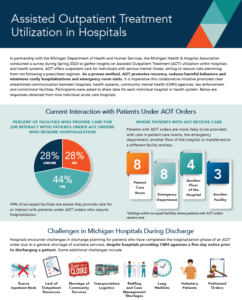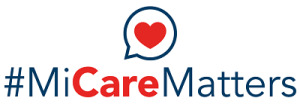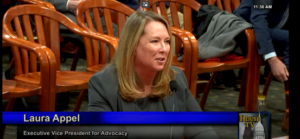
 In partnership with the Michigan Department of Health and Human Services, the MHA conducted a survey during Spring 2023 to gather insights on Assisted Outpatient Treatment (AOT) utilization within hospitals and health systems.
In partnership with the Michigan Department of Health and Human Services, the MHA conducted a survey during Spring 2023 to gather insights on Assisted Outpatient Treatment (AOT) utilization within hospitals and health systems.
AOT offers outpatient care for individuals with serious mental illness, aiming to reduce risks stemming from not following a prescribed regimen. As a proven method, AOT promotes recovery, reduces harmful behaviors and minimizes costly hospitalizations and emergency room visits. It is imperative this collaborative initiative promotes clear streamlined communication between hospitals, health systems, community mental health (CMH) agencies, law enforcement and correctional facilities. Participants were asked to share data for each individual hospital or health system.
Based on the survey results, the MHA created an infographic report that summarizes the strengths and gaps within the existing behavioral health system on AOT utilization. Findings will be used to inform the MHA’s policy and advocacy activities to advocate for improvements to the behavioral health system in Michigan.
Members with questions regarding AOT should contact Lauren LaPine at the MHA.


